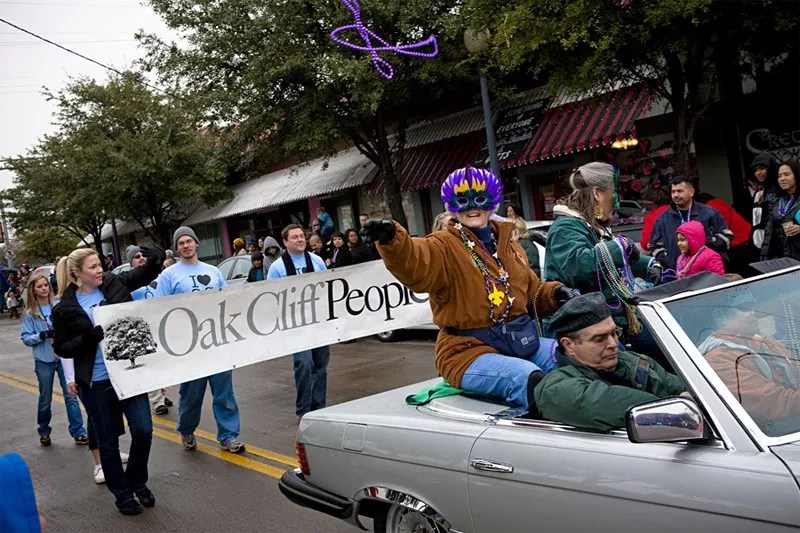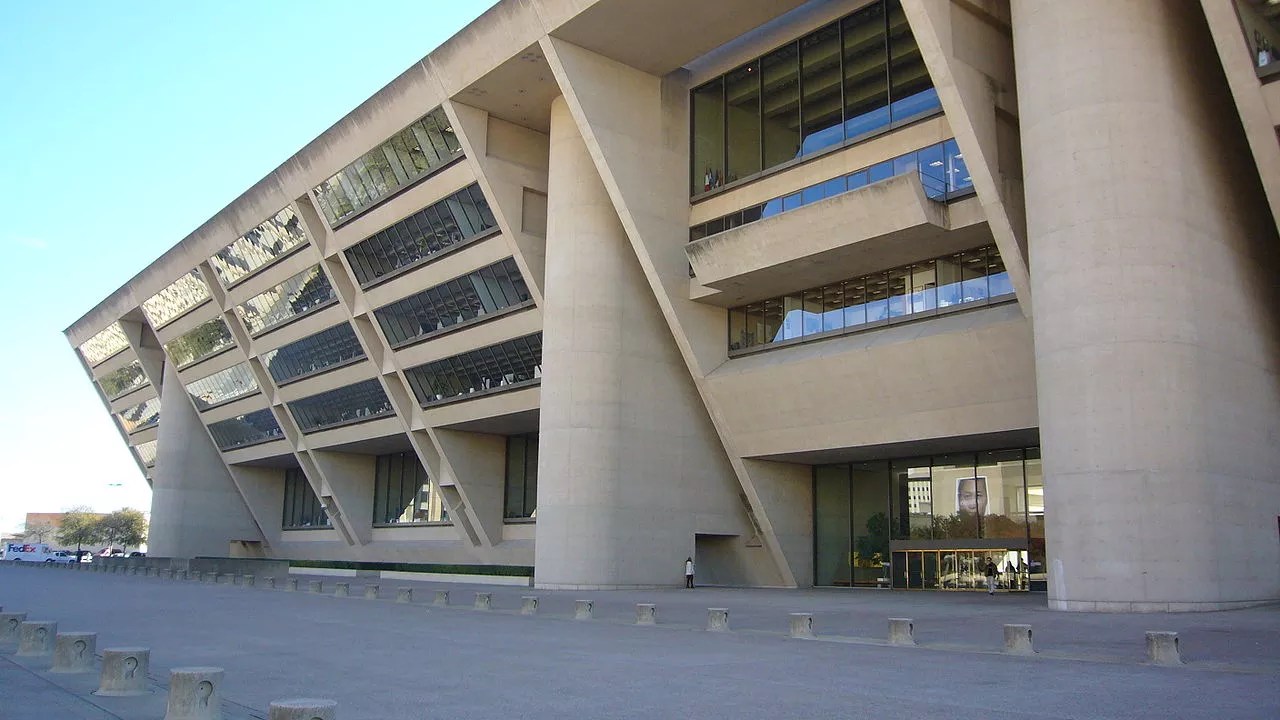
Sara Kerens

Audio By Carbonatix
Last week, almost lost in the dense postpartum coverage of the Amazon’s-not-coming-here story, I found what I thought was an utterly fascinating and infuriating vignette.
It was something I should have guessed had happened. It was never a secret. It was something I normally would have assumed was happening. But it was something I still couldn’t quite believe or fully grasp until I saw it on the page.
Giving away the store is never a good idea if it’s going to put the store out of business. Whose store were we going to give away, anyway, and were we giving it away to help somebody else’s store?
Almost at the bottom of a long Nov. 13 story by Jill Cowan in The Dallas Morning News – a story whose headline promised “an exclusive look inside Dallas-Fort Worth’s bid for HQ2” – I found a description of a pitch given to the Amazon scouts by Robert Decherd, CEO of A.H. Belo Corp. and, by the way, Cowan’s boss. Decherd was trying to get Amazon to buy the moribund multi-acre tract that his newspaper used to occupy at the southwest corner of downtown.
My first thought – and it was partially unfair – was that it would have been nice to know earlier that The Dallas Morning News was trying to re-peddle its land as part of the HQ2 pitch. I say “re-peddle,” because Belo had already peddled the land. But there was a codicil in that deal providing that, if Amazon wound up buying it from the people Belo sold to, Belo would get a cut of the Amazon boodle. The land was not totally and finally peddled. Belo and Decherd were still in the picture if it went to Amazon.
I say that my first thought – would have been nice to know – was partially unfair, because we did know. Belo never hid any of that. The Amazon codicil was revealed in the announcement of the sale last October.
Don’t get me wrong. Belo has a right and even a duty to get the best price it can for its land. If anything, I fault myself for not spotting the Belo land nexus sooner in the Amazon bid. How could I miss it?
From pushing for expansion of the city-owned convention center to pushing for construction of a city-owned convention hotel to pushing for a new alignment of the light-rail system downtown, every single position I have ever seen the city’s only daily newspaper take on a major proposed public investment has pointed straight at its own land in the southwest corner of downtown.
What? With more than 7 acres of dead land to sell downtown, did I think Belo was going to take a whiff on a chance like Amazon?
But here’s the part that I did not know and you did not know because none of us could know. In a bid held top-secret until after Amazon announced its decision, a committee of Dallas power brokers was offering up to $600 million in incentives – our money – to win the Amazon second headquarters deal, matched by another $500 million from the state. That fact, had we known it up front, would have triggered an obvious public question about who was getting what for this $1.1 billion gift of public funds. Now, we should look back and at least wonder if that question may not have been the main reason we didn’t know anything about the offer.
We did know there would be an offer. The size of the Dallas offer was somewhere in the ballpark with offers made by other cities, including the two that won the bifurcated relocation deal finally announced. So what I am writing here is not a suggestion or an allegation that ours was a stupid offer, wildly inflated above what it should have been.
Why would we assume these location decisions, in and of themselves, are always good deals? And good deals for whom?
If we assume that winning a huge location decision like the Amazon HQ2 deal is always a good thing, then the Dallas offer was probably a good offer. But hiding the offer itself until the final trigger-pull tricked us into tripping over an all-important prior question: Why would we assume these location decisions, in and of themselves, are always good deals? And good deals for whom?
The reasons for them being a good thing seem self-evident and robust at first blush. The Amazon second headquarters would have brought a critical mass of tech jobs to the region, presumably amping up the region’s already strong growth in that sector.
Well-educated, well-employed people pay lots of local taxes, a good thing for local government. And sometimes a big emblematic presence like an Amazon exudes a certain buzz factor that can’t be reduced to numbers on a balance sheet. Winning Amazon would have caused more people elsewhere to think of Dallas as a winner.
But like everything else in the real world, there are limits. Giving away the store is never a good idea if it’s going to put the store out of business. Whose store were we going to give away, anyway, and were we giving it away to help somebody else’s store?
Whose store would have benefited? Would it by any chance be the store owned by the newspaper that’s supposed to be keeping us up to date on all this?
We have talked here before about the counter-narrative on tax incentives. For example, we have discussed the work of Nathan M. Jensen, a professor of political science at the University of Texas at Austin, and Edmund Malesky, a political science professor at Duke University in North Carolina, co-authors of a new book called Incentives to Pander: How Politicians Use Corporate Welfare for Political Gain.
Jensen and Malesky argue that we need to take a rigorous bean-counting look at the tax incentives most cities just heave out the window blindly like the magic beans in “Jack and The Beanstalk.” They say a strict accounting of most of those giveaways shows at the bottom of the page that the community itself loses money and resources, especially in the area of opportunity cost.
Opportunity cost, not just in incentives but in all of the spending decisions the city makes, has been a recurring concern of the new, younger, so-called progressive element on the Dallas City Council. I say “so-called,” because I actually see a certain fiscal conservatism in them.
Council member Philip Kingston, for example, excavated an interesting fact about the hugely embarrassing Margaret McDermott suspension bridge over the Trinity River, still not safe for even pedestrian traffic a year after completion. The public paid $100 million for two bike lanes on that bridge – pretty much exactly the amount the city elected not to spend to modernize every traffic light in the city and greatly reduce congestion citywide.
So every spending decision at City Hall has two costs. The money’s gone, and the money isn’t there for something else.
The other counter-narrative we have talked about here is the work of a group called Strong Towns. Led by Charles Marohn, who describes himself as a “recovering engineer,” Strong Towns publishes research showing that big, heavily subsidized land deals always turn out to be net losers for the communities that subsidize them.

You know what City Hall thinks is cool? City Hall. That should tell you what you need to know abut City Hall.
Kent Wang / Wikipedia
The big deals require all kinds of physical infrastructure that the businesses don’t have to pay for because of the incentives they demand and win from obeisant cities. Over decades, while the new owners pay no taxes, the infrastructure wears out and finally needs to be replaced. By then the original owners are long gone; the worn-out property has devolved into the hands of owners who must charge lower rents; the property is worth less and cannot pay the taxes it would take to replace the infrastructure.
So
Beware the man with outstretched palms whose pitch is that he alone should not have to pay. And if somebody at your shoulder is arguing it’s a good deal, try to find out what he gets out of it.
then the planet blows up and everybody turns to toast, right? Well, no, Strong Towns offers another less unhappy version of the future – actually what we see right now in places like East Dallas and North Oak Cliff. It’s those places, Strong Towns argues, where growth is organic, piecemeal, a bit helter-skelter but with an inner vibrancy, that wind up paying their own way, in part because it never occurs to people there to try to get out of paying their taxes.
In other words, beware the man with outstretched palms whose pitch is that he alone should not have to pay. And if somebody at your shoulder is arguing it’s a good deal, try to find out what he gets out of it.
We have been sluicing money out of the upper-story windows of City Hall for so long now, always with ironclad promises that tossing the tax money out the window is going to make us all rich. Wouldn’t it be worth it to go to somebody like Strong Towns or the two authors mentioned above and at least ask them for advice on the accounting? How can we take a hard look at all of the billions we already have given away and find out if any of those deals actually penciled out for us?
Speaking of opportunity cost, when I saw the size of the local Amazon offer – $600 million – my thoughts flew to the crisis of understaffing and capital needs we are suffering in our police and fire departments. If we really had $600 million to give away, what if we did this instead? What if we put every penny of that money into the police and fire departments?
What would it do for the future of Dallas if we were able to tell the world that we had the very safest, most up-to-date public safety system in the country? Or, look, flood control. Hey, Kingston’s traffic lights for that matter.
Instead of whoring ourselves for every shave-headed robber baron who winks at us, what if we just ran a really solid town here?